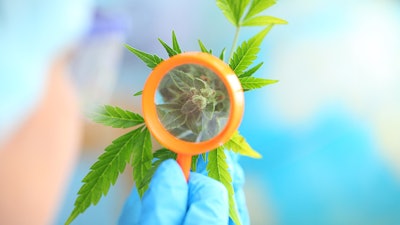
When President Joe Biden signed a bipartisan cannabis research bill in December 2022, it established a new registration process for researchers to study the plant and for manufacturers to supply products for clinical trials and drug development.
Many heralded Biden’s signing as a historic win for the industry: The Medical Marijuana and Cannabidiol Research Expansion Act (H.R. 8454) was the first piece of standalone federal cannabis reform to be enacted since former President Nixon declared drug abuse as “public enemy No. 1” more than 50 years prior.
The act was intended to facilitate research related to a Schedule I controlled drug—cannabis—and its potential health benefits by streamlining the registration process with the Drug Enforcement Administration (DEA) and by removing U.S. Food and Drug Administration (FDA) barriers that often slow the registration process for researchers.
In other words, the act amended the Controlled Substance Act (CSA) for medical research involving cannabis or CBD to loosen the strict controls that generally apply to cannabis as a Schedule I substance.
In creating separate requirements for cannabis researchers and manufacturers, however, the act may have unintentionally cemented certain Schedule I research barriers into place if cannabis is reclassified to a Schedule III substance, according to Congressional Research Service (CRS) Legislative Attorney Dorothy C. Kafka.
“Researchers and manufacturers of Schedule III substances are subject to less-onerous registration requirements than researchers and manufacturers of Schedule I substances,” Kafka wrote in a Sept. 16 CRS Legal Sidebar. “However, medical researchers and drug sponsors of marijuana or CBD-containing drugs would not benefit from these looser restrictions associated with rescheduling without congressional action.”
Kafka pointed to the Medical Marijuana and Cannabidiol Research Expansion Act
“The act created separate requirements for marijuana researchers and manufacturers to expedite registration with the DEA, and these separate requirements would not be affected by rescheduling without additional congressional action,” Kafka wrote.
While this Legal Sidebar is new, the indications behind it—that the Medical Marijuana and Cannabidiol Research Expansion Act would not make cannabis research easier under federal rescheduling to Schedule III—are not.
Remember that time in June 2023 when @admindotlaw told everyone, a second time, that the Medical Marijuana and Cannabidiol Research Expansion Act would make it harder to research cannabis in the event of rescheduling.https://t.co/gHlIZVImuB
— ondrugs (@ondrugsmedia) September 19, 2024
Well, looks like in September 2024,… pic.twitter.com/RheEkw1ZgF
In June 2023, Shane Pennington, a partner in the litigation department at Porter Wright Morris & Arthur LLP, asserted that when the Medical Marijuana and Cannabidiol Research Expansion Act was enacted, it amended 21 U.S.C. 823—specifically registration requirements related to the CSA. By amending Section 823, the act made it more difficult to research cannabis in the event of federal rescheduling, he said.
“By amending Section 823 through a series of marijuana-specific research provisions, H.R. 8454 makes the regulatory burdens it imposes on cannabis research impervious to rescheduling,” Pennington wrote in the “On Drugs” publication he co-founded with fellow attorney Matt Zorn.
“Unlike the prior iteration of Section 823, which imposed different registration requirements on different substances depending on which schedule they are listed in, the new H.R. 8454 imposes a special set of detailed registration requirements on marijuana in particular and regardless of its scheduling classification,” he wrote.
Even before Biden’s signing, Pennington dubbed the act a “counterproductive nightmare.” He explained it this way:
Neither CBD nor a non-marijuana derivative, extract or compound—i.e., any cannabis compound containing less than 0.3% delta-9 THC by dry weight, as defined in the 2018 Farm Bill—are considered controlled substances under federal law. Therefore, before H.R. 8454 was enacted, researchers did not need DEA registration to study CBD or a “derivative, extract, preparation or compound” that meets the legal definition of hemp, according to Pennington.
H.R. 8454, however, imposed DEA registration requirements to study CBD or marijuana-derived compounds—even those that meet the legal definition of hemp.
Pennington used a hypothetical example of “marijuana-derived water” to help convey the changes made under the act.
“To be clear, for you to study marijuana-derived water, somebody would need to extract water from a marijuana plant,” he wrote in July 2022, before Biden signed H.R. 8454. “And because that person would need to handle marijuana to do so, they would need to register with DEA.”
This is true for both before and after H.R. 8454’s enactment, he said.
“The difference is that [before H.R. 8454’s enactment], once the water is extracted from marijuana, anybody can study it, no DEA registration required,” Pennington wrote. “Under [H.R. 8454], by contrast, you would need to register with DEA to study marijuana-derived water—even if you didn’t manufacture it—simply because it qualifies as a ‘derivative, extract, preparation, or compound’ of marijuana.”
Pennington also expressed concerns over H.R. 8454 providing the DEA (via the attorney general) with the power to block the legal supply of cannabis material for researchers by simply not placing a notice in the Federal Register to accept applications from manufacturers.
He also found fault in the act’s inclusion of deadlines for the DEA to process applications because there are no enforceable consequences for missing those deadlines and because the DEA can avoid triggering the deadlines by refusing to accept an application as “complete,” he said.
Under the act, the attorney general has no more than 60 days after receiving a “complete” research application to approve the application or request additional information from the applicant. The attorney general then has no more than 30 days to approve or deny an application after receiving the additional information requested.
Reps. Earl Blumenauer, D-Ore., and Andy Harris, R-Md., who sponsored the act, sent a letter to the heads of the DEA and U.S. Department of Health and Human Services (HHS) in March 2024, saying they were “troubled” that H.R. 8454 was not being implemented in line with congressional intent more than a year after its enactment.
This letter came after the HHS missed a December 2023 deadline to provide Congress with a report on the federal barriers to cannabis research, as directed in the law.
RELATED: Lawmakers 'Deeply Concerned' About Medical Cannabis Act's Implementation
“It is unacceptable that researchers continue to face harmful barriers to cannabis research after Congress expressly encouraged research into this substance,” Blumenauer and Harris wrote.
Their letter came at a time when more than 150 pending research applications had not received approval or denial from the FDA and “many more” were excluded from the DEA’s licensing process, according to the congressmen.
Editor's note: Blumenauer’s office provided Cannabis Business Times a prepared statement regarding the Sept. 16 CRS Legal Sidebar shortly after this article was first published.
“This is a nonbinding interpretation," Blumenauer told CBT of the CRS report. "The aim of this legislation is crystal clear: ease research restrictions on medical marijuana. While I remain confident that cannabis will receive every benefit of rescheduling, I look forward to clarifying this interpretation from the Congressional Research Service.”
Earlier this month, MMJ BioPharma Cultivation filed a lawsuit against Attorney General Merrick Garland and DEA Administrator Anne Milgram in a case related to the company’s DEA bulk manufacturing application to grow pharmaceutical cannabis for FDA-approved clinical trials targeting multiple sclerosis and Huntington’s disease.
The lawsuit claims the DEA is delaying and obstructing the approval of MMJ BioPharma’s application in violation of the CSA and Medical Marijuana and Cannabidiol Research Expansion Act. The company asserted that it fulfilled all registration requirements having filed two investigational new drug applications with the FDA.
In this specific case, MMJ BioPharma has been waiting since December 2018 for DEA approval to legally cultivate cannabis for research and development for use in FDA clinical trials.
The DEA has maintained that its process—for ensuring strict controls are met under the CSA—is justified given that cannabis remains a Schedule I substance.
Looking ahead to the possibility of cannabis being reclassified to Schedule III, those strict controls for cannabis research could remain under the Medical Marijuana and Cannabidiol Research Expansion Act, according to Pennington and, now, the CRS.
“Not only does it make cannabis research harder than ever, but it cements its backward, anti-science regime in place for good, ensuring that cannabis research will remain a near ‘Mission Impossible’ even if cannabis is transferred to Schedule II, III, IV, or V,” Pennington wrote.

























